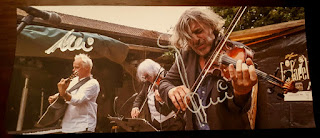Nicholas Michael de Roumanie Medforth-Mills, formerly
Prince Nicholas of Romania, (born 1 April 1985) is the eldest child and only son of
Princess Elena of Romania and
Robin Medforth-Mills. As a grandson of
Michael I, the former king of Romania, he was third in line to the
defunct throne of Romania according to a new family statute enacted in 2007, that also conferred the title of a "prince of Romania" on him
[2] which was
abrogated in 2015. The statute and the titles it confers have no standing in present Romanian law.

Nicholas Medforth-Mills was born on 1 April 1985 at La Tour Hospital in
Meyrin, a
commuter town near
Geneva, Switzerland, the first child and son of
Princess Elena of Romania and her first husband
Robin Medforth-Mills and the second grandchild of
King Michael I of Romania and his wife
Queen Anne.
[3]
He was baptised in the
Orthodox faith, his godparents being Queen Anne (his maternal grandmother) and
Crown Princess Margareta of Romania (his maternal aunt).
[4]
He was followed by a sister, Elisabeta-Karina (born 1989).
Prince of Romania
In 1997, Romanian monarchists intended to ask Michael to designate a male heir-presumptive from the
House of Hohenzollern in keeping with the rules of the last
royal constitution which were based on
agnatic primogeniture and "
Salic law";
The monarchists eventually agreed on a compromise and requested him to
designate a male rather than female heir-presumptive, in the person of
Nicholas. However, under the influence of Queen Anne, Michael rejected
the monarchists' request, and at the end of 1997, he designated Princess
Margareta as heir presumptive in keeping with the
European Convention on Human Rights,
[25]
which meant Nicholas would only succeed to the headship of the royal
family after the deaths of King Michael, Crown Princess Margareta and
his mother.
In 2005, Michael told Medforth-Mills that he could choose to have
the chance of becoming a "prince of Romania" which would mean assuming
responsibility in a conscious manner by starting to work for the
country.

On 30 December 2007, the press office of King Michael announced
that Nicholas Medforth-Mills would receive the title "prince of Romania"
with the
style of "royal highness", coming into effect on Nicholas's 25th birthday. On 1 April 2010,
[2] by virtue of his new title, he became a member of the Romanian royal family
[26] and was decorated with the
Nihil Sine Deo, the highest of royal decorations at the time.
In February 2008, Nicholas stated in an interview with the Romanian daily newspaper
Cotidianul that if the Romanian people asked him to become king, he would not refuse.
[27]
In September 2012, after his university studies, he moved to Romania to undertake more of the royal family's public activities.
[28]
Removal of succession rights and princely title
On
1 August 2015, former King Michael of Romania signed a document
removing the title prince of Romania and the qualification of royal
highness from his grandson. Medforth-Mills also has been removed from
the line of succession. The former king took the decision after
considering that Romania needed a ruler marked by modesty and moral
principles, respect and thought for others after the "reign and life" of
his eldest daughter, Crown Princess Margareta, will have finished. In
issuing the declaration, the former king expressed the hope that
"Nicholas will find in future years a suitable way to serve the ideals
and use the qualities that God gave him". Nicholas's mother, Princess
Elena, received notification of the former king's decision in a personal
letter.
[29]

The move "stunned Romanians" and "sparked speculation that a
jealous relative had sought to edge Nicholas out of the succession."
[30] Marlene Eilers Koenig
speculated that the exclusion of Nicholas from the royal succession was
due to the birth of an illegitimate daughter, born from a short
relationship with Nicoleta Cîrjan.
[31] The child, born 9 February 2016 and named Iris Anna, was not recognized by the former prince.
[32]
Nicholas released a press statement on 18 November 2017 from London about the child.
[33]
Point 2 of the Press release stated, "I returned to Romania in November
2015 to resolve the situation with my alleged child. Due to the
constant lack of co-operation from the mother of my alleged child, this
situation has remained unclear. So far, there is no medical evidence to
support the mother's accusations. Therefore, any accusations that are
related to this subject are unfounded."
[33]
On 27 May 2019, Nicholas confirmed via a Facebook post that paternity
tests had confirmed the illegitimate child is his, and that he had
assumed legal responsibility for the child.
[
 Léopold Sédar Senghor (9 October 1906 – 20 December 2001) was a
Senegalese poet, politician, and cultural theorist who for two decades
served as the first president of Senegal (1960–80). Ideologically an African socialist, he was associated with the Négritude movement. He was the founder of the Senegalese Democratic Bloc party.
Léopold Sédar Senghor (9 October 1906 – 20 December 2001) was a
Senegalese poet, politician, and cultural theorist who for two decades
served as the first president of Senegal (1960–80). Ideologically an African socialist, he was associated with the Négritude movement. He was the founder of the Senegalese Democratic Bloc party.




